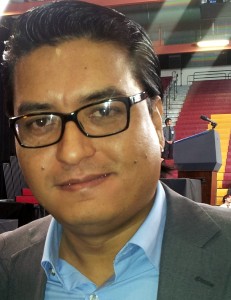Jay Maharjan: Entrepreneurship in the Conceptual Economy

SK: Jay, thank you for sharing your success story with our readers in the US and Canada. Congratulations to you on your recently published book Winning Lessons for Entrepreneurs in the Conceptual Economy.
We start our conversation with a rather simple yet most important question,”Why did you write this book?”
JM: Because of interesting ventures that I had started or been a part of, I was told often that I should document my experiences in a book. I dabbled into writing many times over. In 2012, when I decided to dedicate my time fully for writing, this time around, I knew I would commit to get it done.
I had just finished a three year long, successful venture. Because of the scale and the broad responsibility that came along with the entrepreneurial project, I had a priceless opportunity to learn many lessons in terms of successfully scaling businesses and more importantly, dealing with people from all walks of life. My leadership created jobs for over 500 individuals in a relatively short period of time.
Besides this immediate venture, I was involved in a wide variety of projects dating back to 2001. Work of an entrepreneur is always a work in progress. By all means, it is not a perfect, solution oriented book. Rather, I have asked few questions and shared meaningful stories that shaped my entrepreneurial career and reflected more on who I am and why I do what I do. What better time for me to share with the world few anecdotes than now, I thought.
SK: I noticed that you said several times during our conversation,”It’s important how you think.” How do you think, analyze, and make right decisions in life and business? What makes you successful?
I think the first thing that successful entrepreneurs do is take time to meaningfully define what being successful means.
I grew up within a family with rocksolid family values, who defined success differently. And, during my entrepreneurial career, I continued to have mentors and colleagues who aligned with my values who consistently inspired me. As I often mention in my writings, Peter Drucker would be one of those individuals who influenced me greatly in the way that I think about entrepreneurship and business. As most entrepreneurs can probably relate to me, making decisions would be the single most important trait that is essential to have a sustaining career in entrepreneurship. I am not referring to only making right decisions. Human beings are not capable of making right decisions all the time. Making a wrong decision at the right time can lead to opportunities to fix your mistakes and make a larger impact in a long run as a result. In my view, entrepreneurs tends to get emotional and let minor setbacks influence ongoing decisions.

Photo courtesy of Jay Maharjan
SK: Being a 19-year-old intern for Chrysler in the 90s, you created an entrepreneurial device that saved Chrysler 30mm. How this experience influenced your engineering career?
JM: The savings was in that range. It was a single defining moment for me to reassess engineering as a career. What I experienced during my two-month experience at Chrysler was that engineering profession was not what I believed it would be. A solution that could be devised by an intern using a rationale that an army of engineers chose to ignore gave this young intern a priceless perspective and validation that technology and science knowledge by itself is just that. You need entrepreneurial acumen to bring products to life and put to use in a way that end-consumers would want to adapt and see a clear value.
SK: You could have settled for a safe job and security, but you chose a different path to pursue your passion to become an entrepreneur.
JM: Entrepreneurship is a calling. Though, I believe that while skills can be acquired to be a better entrepreneur, one needs early validation that the wild ideas that you have have some merit to it. And, it is extremely important to want to be an entrepreneur. I enjoy every moment of everything that I do as an entrepreneur.
You have to defy the logic and rationale and move forward head on. I have been fortunate to experience fruits of labor in more than one instance. But, if you look at statistics, odds of making as an entrepreneur are not good. But again, it does not matter. The notion and the discouraging data of this kind often become the driving force that motivates entrepreneurs to make things happen.
SK: Peter Drucker was your mentor. What did you learn from him? What is the natural way to find a mentor?
I learned from Drucker that there is surely nothing quite so useless as doing with great efficiency what should not be done at all. I learned to make decisions wisely and quickly.
The mentor/mentee relationship is an interesting one. I think hierarchy based knowledge economy made mentors look like super heroes that mentees continuously learnt from. I believe that it is a wrong approach to look at a mentor/mentee relationship. In the conceptual age, hierarchy based relationships will be less relevant. I like the definition of mentorship as the relationship where a mentor empowers mentee(s) to be more successful than him or her. There are no rules to find a mentor. Mentors can come from all walks of life. Teachers could be great mentors. We have to strive to build a better culture in America where the work that teachers do is valued more.
SK: I love your quote, “You become an entrepreneur not for glory.” What was your first start up?
JM: As a student in the middle school in Kathmandu, I built a team and pitched my faculty member to invest in my science project of building a prototype for generating hydroelectricity. Looking back, it was very much an entrepreneurial venture. Because of the edge I had with the small financial investment, we built the state-of-the-art prototype with full blown working models. I recall fondly that the project made it to the national competition and we won several accolades. In college, I started a company with my sup wiz friend building a consolidated server using open source, innovative technologies. I quickly marketed on campus, secured local clients who gave us projects on a regular basis. Our model was widely recognized in the national and international media outlets as the model ahead of its time. For situations beyond our control, the whole open source initiative came to a hault in early 2000’s . But, lessons learned made us stonger and wiser.
SK: What are a few winning lessons for entrepreneurs in the conceptual economy?
JM: I can go on forever. Let me give you few quick takeaways.
1) Embrace art, design thinking in the overall entrepreneurial process. It is natural to focus on money, but, any sustainable, entrepreneurial successful outcome comes from a longer, methodical process that involves planning and creative thinking.
2) Be aware of the interdisciplinary component. Anymore, it is not enough to be good at only one area. Disruptions in the conceptual age will come from interdisciplinary innovation.
3) Embrace social media, technology. Twitter is not a fad. Learn to be most effective in the manytomany communication environment.
SK: Your passion for helping young entrepreneurs is contagious. I got inspired and learned from just listening to you. What is your role as a Statewide Leader for StartUp America and UpGlobal/UpNevada?
JM: Thank you. I am a region champion for the Southwest region of Startup America Partnership and took on a role of state wide leadership in bringing the Startup America initiatives in the state of Nevada. Startup America Partnership is the White-House-launched, the private-sector-led initiative to foster entrepreneurship throughout the nooks and crannies of the state. I represented the state of Nevada in Regional Startup America summits, made various recommendations, including offering feedback during the process of forming the new entity (UP Global, upon combining forces between Startup America Partnership and Startup Weekend).
We have introduced, supported successfully many programs in the state, including:
Project Vesto (100K Prize money State wide Business Plan contest)
@ExploreNano: the initiative that we are in the process of scaling and making Nevada a regional hub for Nano technology commercialization.
@Ecoentrepreneur: Via this initiative, we are supporting various energy related initiatives in the state.
@4entrepreneur: Via 4entrepreneur, we are actively supporting initiatives in the state, including the downtown project, different Bioscience clusters and the entertainment projects in Las Vegas.
I highly encourage entrepreneurs to attend or start a Startup Weekend event in their home towns.
SK: Jay, you said that investors are actively looking for great ideas and start ups. What is your advice to start ups who are looking for investors?
JM: The key is to be found for a unique business idea that addresses pain points of consumers.
Investors will fight over a good project. The key is to create sustainable customers prior to seeking investments.
Customers validate the potential for your business model. If you happen to be in the geographic region where there is no active base for investors, you would want to pursue proactively via:
1) local incubators who mentor and invest on ideas
2) local angel investment groups
3) Private grants
4) Government backed grants for new innovative ventures ( e.g. eco, new science ventures )
5) SBA backed bank loans
6) Direct loans via credit union
SK: In your book you talked about how our economy is moving to the conceptual age. The accelerating demand for workers who don’t simply have the know-how, but also the ability to create, analyze, and interact effectively with others. There is tremendous need for creativity, collaboration, and innovation.
JM: Yes, it is extremely important. The knowledge economy brought about tremendous industrial discipline in the way enterprises were formed, scaled and sustained. We are seeing a fundamental shift in the way the knowledge economy is transforming into a more collaborative economy led by creative entrepreneurs. Gone are the days when knowledge jobs guaranteed sustainable careers. The conceptual age demands entrepreneurial passion, combined with the right level of competence (with adequate knowledge in technology and business) and more importantly, combining with an art component in the overall thinking process.
SK: Jay, you were an Associate Producer of Highway, a Nepali movie by Deepak Rauniyar which was coproduced by Danny Glover, who is well known for his role as Mr. Albert in The Color Purple and as Michael Harrigain in Predator 2.
JM: Yes. Deepak is a talented director who had a previous success with a short film at Cannes. I was friends with Sameer Dixit, a good friend who attended the same school as I did when we were young. During my short trip to Nepal in late 2009, through a chance encounter after over twenty years, we connected to conceptualize the framework for Highway. Danny Glover and his production company have been instrumental in offering support and guidance to take the film to the next level. The movie was selected for 2012 Berlin International Film festival.
SK: What’s next for you, Jay?
JM: My passion for entrepreneurship and supporting passionate entrepreneurs will stay with me for the rest of my life. I would like to pursue more meaningful, creative projects. I will get involved more on advocating for migrant workers in the Middle East. I will continue to get involved in entrepreneurial ventures as an investor, a mentor and an entrepreneur.
With the strong support that I have been receiving for my book, I would like to publish more books on entrepreneurship and the unfolding of the conceptual age under the banner: Venture Loft.





